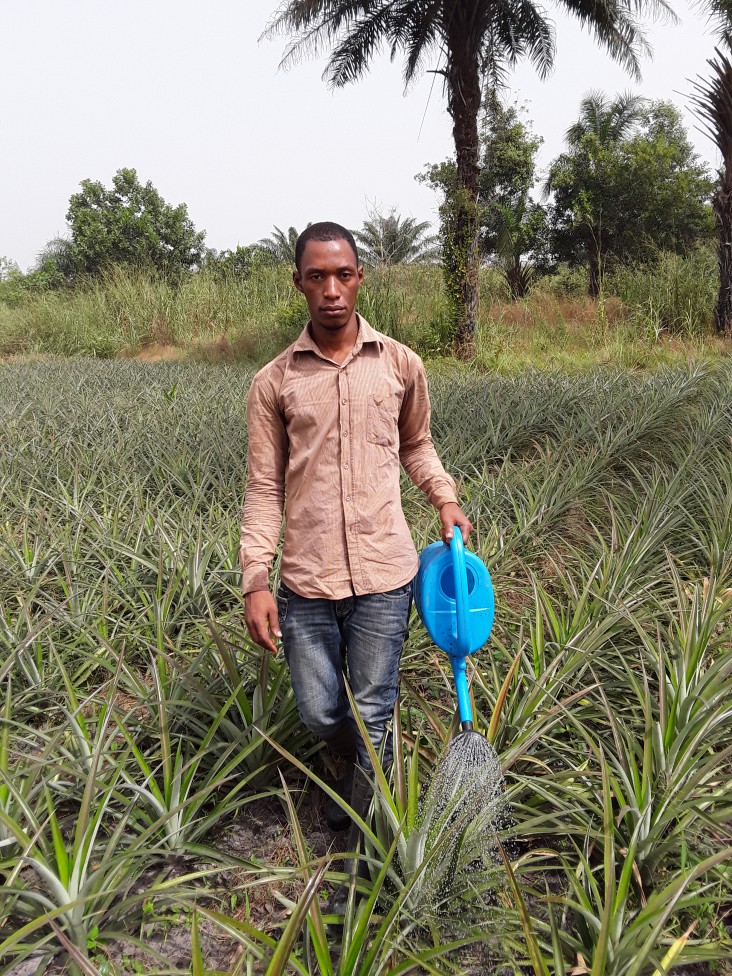Speeches Shim

May 2018 — In Guinea, most young graduates are looking for their first job. Agriculture is a sector with high job potential that can attract and retain young people if policies promote access to credit at reasonable rates, guaranteed contracts, and training both in production and marketing of agricultural products.
Mohamed Camara, 28, is an agricultural extension agent specializing in pineapple production in Kindia. After studying mining at the Higher Institute of Mines and Geology in Boké, he spent months searching for his first job, to no avail. Adding to his difficulties, Camara lost both parents the same day and five other members of his family a week later to the Ebola virus.
Because the tragedy left him with nine younger brothers to care for, Camara began to grow pineapples. “As I had some knowledge of pineapple growing when I was at university, I decided to start a business in it when I had lost hope of finding a job,” he said.
In 2015, Camara received 5 million Guinean francs (GNF), or $550, from his elder brother Khalidou to start a business and help in supporting the family. He bought and planted 5,000 pineapple plants on a piece of land left by his father. Because the production cycle of pineapple is long — 18 months — he sold gasoline to take care of his needs and those of his brothers, who are all in school. His first harvest in November 2017 earned him 15 million GNF ($2,700).
“I used part of the money to buy a bike and run it as taxi, and I also bought 3,000 pineapple plants to increase my farm,” said Camara.
But despite the success of his first try, Camara knew that he had a lot to learn about growing pineapples. “Like in any profession, agriculture needs training and updating knowledge and practices. I lacked the real knowledge of pineapple planting,” he confessed.
In 2017, Camara applied for the Apprenticeship Program in Extension, Entrepreneurship and Rural Innovation (AVENIR), a component of the USAID-funded Guinea Agricultural Services project. He was among the first cohort of 49 young people who attended the four-week training to learn better farm practices, such as seed bed preparation, seed selection, choice of market varieties, timing of planting, proper spacing, row cropping, intercropping, optimum plant population, fertilization and soil management, and pest and disease identification and control. After the four weeks of class training, he received eight months of practical training with a pineapple producer.
The AVENIR apprenticeship program is designed to train and provide practical business experience for 640 young unemployed Guinean graduates to equip them with the skills to develop agricultural enterprises.
By applying his new skills, Camara has developed a pineapple plantation of 24,500 plants. He is planning to buy a hectare of land to plant more pineapples on highlands. This year he expects to harvest 26 tons of pineapples, with an estimated value of $8,600. The Guinea Agricultural Services project has linked him to customers from Senegal and the Gambia who are ready to buy his entire harvest.
“My dream is to become the biggest pineapple producer in the Lower Guinea region and be able to employ more than 100 young Guineans like myself,” he said.
Camara and the first cohort of AVENIR agents are now taking part in the last phase of the program, CAPSTONE training, to learn how to make business plans, find partners, and finance and manage enterprises.
The Feed the Future Guinea Agricultural Services project, which runs from 2016 to 2021, is designed to improve rural and agriculture-based livelihoods as well as improve nutrition. Private sector partners are invited to leverage technical expertise, innovations, networks and financial resources to advance Guinea`s agricultural sector.
LINKS

Comment
Make a general inquiry or suggest an improvement.